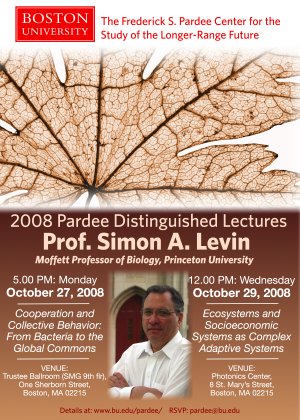Simon Levin on “Complex Adaptive Systems”
VIDEO: Distinguished Lecture Series
October 29, 2008
Professor Simon A. Levin, the Moffett Professor of Biology at Princeton University and the Director of Princeton’s Center for BioComplexity, today delivered his second of two 2008 Frederick S. Pardee Distinguished Lectures at Boston University.
In his noontime talk at BU Photonics Center today, Professor Levin emphasized the need for new global institutions to promote multidisciplinary cooperation and collaboration to address emerging problems in all areas, from the environment to economics. He pointed out that a sustainable future means much more than environmental sustainability, incorporating also social justice, economic growth, and global security, among other things.
Titled “Ecosystems and Socioeconomic Systems as Complex Adaptive Systems,” his talk explored problems of sustainability in complex adaptive systems drawing from examples in ecology as well as economic and political behavior. He defined complex adaptive systems as those in which individuals make decisions and those decisions cause macroscopic consequences. Reiterating themes from the first lecture on Monday evening, Professor Levin pointed out that individual stockholders make self-interested decisions about buying or selling based on their information and the influences of people around them, yet collectively, all those individual decisions can have the macroscopic effect of causing the market either to soar or to crash.
As a specific example, Professor Levin invoked the research and management of fisheries. Although there is a long history of sustainable fisheries management, sustainability is declining and fish biodiversity is disappearing. The reason? Management systems do not seem to be accomplishing their goals. Professor Levin then argued that to promote sustainability of such systems, we must focus on the macroscopic features, or the higher level patterns, while recognizing that control of those features ultimately lies at lower levels of organization where individual decisions are made.
 According to Professor Levin, addressing such problems, whether in ecology, global security, or economic growth, requires new partnerships among various disciplines and with practitioners. He pointed out that ecology has already built partnerships with mathematics, physics, and engineering, but faces the new challenge of cooperation with the social sciences.
According to Professor Levin, addressing such problems, whether in ecology, global security, or economic growth, requires new partnerships among various disciplines and with practitioners. He pointed out that ecology has already built partnerships with mathematics, physics, and engineering, but faces the new challenge of cooperation with the social sciences.
Although complex adaptive systems all give rise to emergent macroscopic patterns, the emergent patterns “carry no assurance of the collective good.” For that reason, he argues that new types of collaborative institutions are required. “We need new institutions to achieve this kind of cooperation, both for economic and environmental systems. This is the only way we are going to achieve a better future both for our children and our grandchildren.”
Professor Simon Levin is a Fellow of the American Academy of Arts and Sciences and the American Association for the Advancement of Science as well as a Member of the National Academy of Sciences and the American Philosophical Society. He chairs the Governing Council for International Institute for Applied Systems Analysis (IIASA), and co-chairs the Science Board of the Santa Fe Institute. He is a former President of the Ecological Society of America and the Society for Mathematical Biology, and a past Chair of the Board of the Beijer Institute of Ecological Economics. Among other awards, he won the MacArthur Award (1988) and the Distinguished Service Citation (1998) of the Ecological Society of America, and the Okubo Award of the Society for Mathematical Biology and the Japanese Society for Theoretical Biology. He was honored with the Dr. A.H. Heineken Prize for Environmental Sciences by the Royal Netherlands Academy of Arts and Sciences (2004), the Kyoto Prize in Basic Sciences (2005) by the Inamori Foundation, and the Distinguished Scientist Award of the American Institute of Biological Sciences.